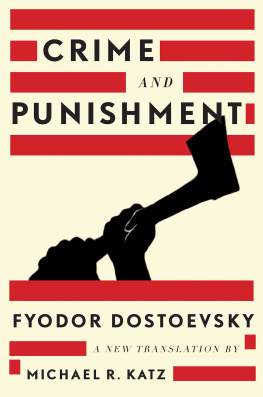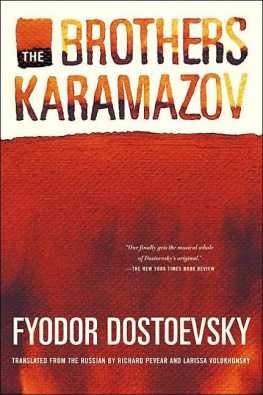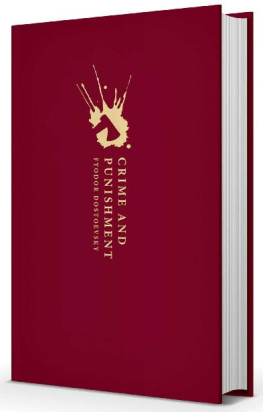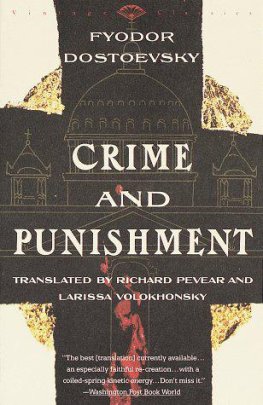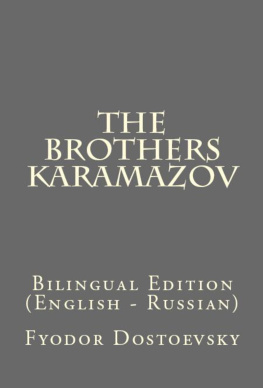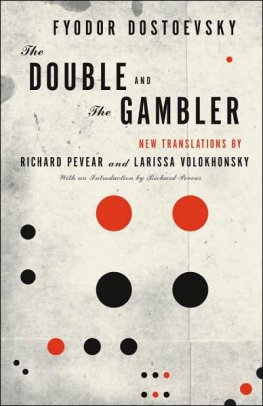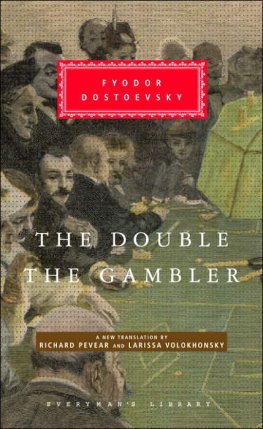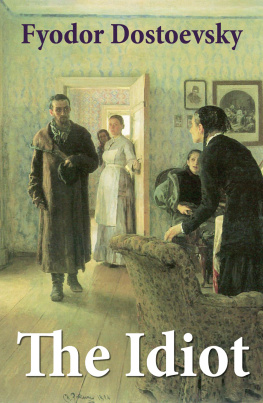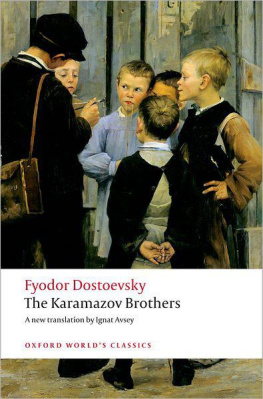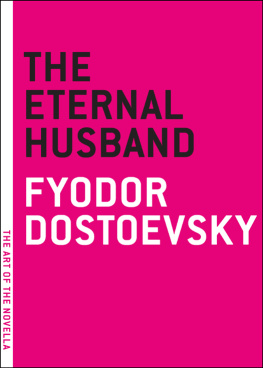Fyodor Dostoevsky - Brothers Karamazov
Here you can read online Fyodor Dostoevsky - Brothers Karamazov full text of the book (entire story) in english for free. Download pdf and epub, get meaning, cover and reviews about this ebook. year: 1977, publisher: Modern Library, genre: Detective and thriller. Description of the work, (preface) as well as reviews are available. Best literature library LitArk.com created for fans of good reading and offers a wide selection of genres:
Romance novel
Science fiction
Adventure
Detective
Science
History
Home and family
Prose
Art
Politics
Computer
Non-fiction
Religion
Business
Children
Humor
Choose a favorite category and find really read worthwhile books. Enjoy immersion in the world of imagination, feel the emotions of the characters or learn something new for yourself, make an fascinating discovery.

- Book:Brothers Karamazov
- Author:
- Publisher:Modern Library
- Genre:
- Year:1977
- Rating:3 / 5
- Favourites:Add to favourites
- Your mark:
- 60
- 1
- 2
- 3
- 4
- 5
Brothers Karamazov: summary, description and annotation
We offer to read an annotation, description, summary or preface (depends on what the author of the book "Brothers Karamazov" wrote himself). If you haven't found the necessary information about the book — write in the comments, we will try to find it.
Brothers Karamazov — read online for free the complete book (whole text) full work
Below is the text of the book, divided by pages. System saving the place of the last page read, allows you to conveniently read the book "Brothers Karamazov" online for free, without having to search again every time where you left off. Put a bookmark, and you can go to the page where you finished reading at any time.
Font size:
Interval:
Bookmark:

The Brothers Karamazov
Fyodor Dostoevsky
Introductory Essay by Konstantin Mochulsky
Translated by Andrew R. MacAndrew
The best way of handling a translation is about as slippery a business as the best way of organizing a society, the best way of living a life, or, for that matter, the best way of writing. In dealing with a piece of literature a translator must hear its tone, judge its language, appreciate its style, and understand its subtleties of meaning, and then as if such passive appreciation were not hard enough, he must re-create all these features as closely as possible in a tongue foreign to the original.
In trying to convey the essence of a literary work in another language, he is in the position of a conductor of an orchestra of outlandish instruments asked to perform a classical symphony. He must first adapt the piece to the unfamiliar instruments and then guide his barbarous musicians through it. If he is tone-deaf in the language into which he translates, the effect may be like playing the Moonlight Sonata on a tin can.
Andrew R. MacAndrew
Konstantin Mochulsky
I N 1839 the eighteen-year-old youth Dostoevsky wrote to his brother: Man is a mystery: if you spend your entire life trying to puzzle it out, then do not say that you have wasted your time. I occupy myself with this mystery, because I want to be a man.
The great psychologist had a presentiment of his vocation: all his creative work is devoted to the mystery of man. In Dostoevskys novels there are no landscapes and pictures of nature. He portrays only man and mans world; his heroes are people from contemporary urban civilization, fallen out of the natural world-order and torn away from living life. The writer prided himself on his realism ; he was describing not the abstract universal man, contrived by J. J. Rousseau, but the real European of the 19th century with all the endless contradictions of his sick consciousness. The Russian novelist first discovered the real face of the hero of our troubled timethe man from underground: this new Hamlet is struck by the infirmity of doubt, poisoned by reflection, doomed to a lack of will and inertia. He is tragically alone and divided in two; he has the consciousness of an harassed mouse.
Dostoevskys psychological art is famous throughout the world. Long before Freud and before the school of psychoanalysts he plunged into the depths of the subconscious and investigated the inner life of children and adolescents; he studied the psychics of the insane, maniacs, fanatics, criminals, suicides. Special commentaries exist on Dostoevsky, the psychopathologist and criminalist. But his analysis was not limited to individual psychology; he penetrated the collective psychology of the family, of society, of the people. His greatest insights concern the soul of the people, the metapsychic unity of mankind.
Psychology is only the surface of Dostoevskys art. It was for him not an end, but a means. The province of the inner life is only the vestibule of the kingdom of the spirit. Behind the psychologist stands the pneumatologist the brilliant investigator of the human spirit. In one of his notebooks we find the following remark: I am called a psychologist, its not true, I am only a realist in the highest sense, i.e., I depict all the depths of the human soul. Dostoevsky had his own doctrine of manand in this is his great historical importance. He devoted all his creative forces to struggling for the spiritual nature of man, to defending his dignity, personality, and freedom.
In his own personal experience, the author of Crime and Punishment lived through the tragic epoch of the shattering of humanism . Before his eyes humanism tore itself away from its Christian roots and was transformed into a struggle with God. Having begun with the emancipation of man from theology and metaphysics, it ended by enslaving him to the laws of nature and necessity. Man was conceived as a natural being, subject to the principles of profit and rational egoism: his metaphysical depth was taken away from him, his third dimensionthe image of God. Humanism wanted to exalt man and shamefully degraded him. Dostoevsky himself was a humanist, passed through its seductions and was infected by its poison. The romantic idealist of the years of Poor People was captivated by utopian socialism and passed through the whole dialectical course of its development: he passionately accepted Belinskys atheistic faith and entered Durovs secret revolutionary society. Starting out from Christian humanism, he came to atheistic communism. In the year 1849, sentenced to capital punishment, the writer stood on the scaffold. During these terrible minutes the old man in him died. In penal servitude a new man was born; there began a cruel judgment of himself and the regeneration of his convictions. In Siberia, two events took place in the life of the exiled writer which decided his whole subsequent fate: his meeting with Christ and his acquaintance with the Russian people. Amidst inhuman sufferings, in a struggle with doubt and negation, faith in God was won. Apropos of the Legend of the Grand Inquisitor Dostoevsky wrote in his notebook: Even in Europe there are not and have not been atheistic expressions of such force; consequently, it is not as a boy that I believe in Christ and confess Him, but my hosanna has passed through a great furnace of doubts....
After penal servitude, the religious theme formed the spiritual center of his work. The question of faith and disbelief was posed in all the great novels. In 1870 he wrote to Maikov: The main question, which has tormented me consciously or unconsciously throughout my entire lifethe existence of God.
God torments all of Dostoevskys heroes; all of them decide the question of Gods existence; their fate is wholly determined by the religious consciousness.
Dostoevsky lived through a period of crisis in Christian culture and experienced it as his personal tragedy. Shortly after the Franco-Prussian War and the Parisian Commune, the hero of the novel A Raw Youth went abroad. Never had he traveled to Europe with such sadness and with such love. In those days, especially, one seemed to hear the tolling of a funeral bell over Europe. The great idea of Christian culture was dying; it was being escorted out with catcalls and the flinging of mud; atheism was celebrating its first victories. I wept, confesses Versilov, wept for them, I wept for the old idea and, perhaps, I wept real tears.
The Russian Dostoevsky, at the end of the 19th century, felt himself the only European who understood the significance of the world tragedy, which was being experienced by mankind. He alone wept real tears. And now the old idea was gone and mankind was left on earth without God. The writers novel-tragedies are devoted to depicting the fate of mankind abandoned by God . He prophetically indicated two paths: man-godhood and the herd.
Kirilov in The Devils declares: If God doesnt exist, then I am God. In place of the God-man appears the man-god, the strong personality, who stands beyond morality, beyond the confines of good and evil, to whom everything is permitted and who can transgress all laws (Raskolnikov, Rogozhin, Kirilov, Stavrogin, Ivan Karamazov). Dostoevsky made one of his greatest discoveries: the nature of man is correlative to the nature of God; if there is no God, there is also no man. In the man-god, the new demonic being, everything human must disappear. The Russian writer predicts the appearance of Nietzsche: the superman of the author of
Next pageFont size:
Interval:
Bookmark:
Similar books «Brothers Karamazov»
Look at similar books to Brothers Karamazov. We have selected literature similar in name and meaning in the hope of providing readers with more options to find new, interesting, not yet read works.
Discussion, reviews of the book Brothers Karamazov and just readers' own opinions. Leave your comments, write what you think about the work, its meaning or the main characters. Specify what exactly you liked and what you didn't like, and why you think so.

